On April 17, Japanese Prime Minister Shinzo Abe will once again make the trek to Mar-a-Lago to meet with President Trump. Their first meeting at the Florida resort in February 2017 was a high point in the relationship. Abe and Trump bonded over golf, and while the former used the occasion to explain the benefits of the Trans-Pacific Partnership (TPP) to no avail, President Trump chose not to make trade an issue of sharp disagreement. The dramatic scenes when the two leaders interrupted their dinner upon news of the latest North Korean missile test were a highlight, especially when President Trump ceded the spotlight to Prime Minister Abe in ascertaining their joint resolve in confronting Pyongyang’s nuclear threat.
But long-distance relationships are complicated, and the stakes of their second rendezvous at Mar-a-Lago this week are high. This meeting can be an early harbinger of whether the Abe-Trump special relationship will rekindle or cool off.
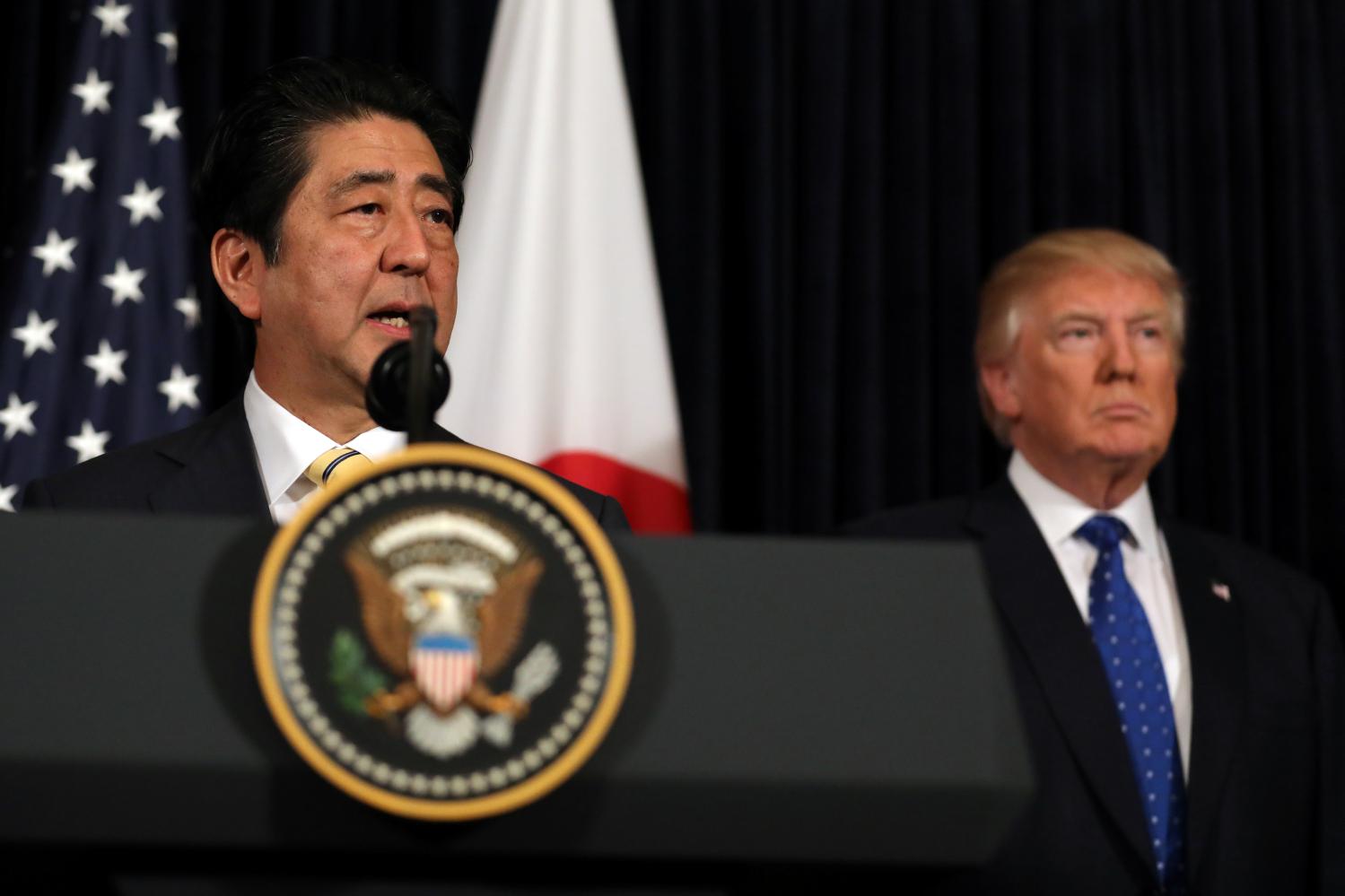
Embattled leaders don’t make good dates
Prime Minister Abe and President Trump are coming to this meeting bruised from political reversals at home. More importantly, the tighter political constraints each confronts create very different incentives for how closely to embrace the other. Abe is in a precarious situation politically, with cronyism scandals roaring to life. The Moritomo and Kake Gakuen scandals revolve around the question of undue political influence to facilitate the sale of government land with a steep discount to a controversial private school, and the approval of a new veterinary school for a friend of the prime minister. The scandals resurfaced this year over the issue of a possible cover-up of the original misdeed. Abe’s standing with the public has taken a hit: The latest NHK poll shows that in April, more people disapproved (45 percent) than approved (38 percent) of the Abe cabinet, and it is unclear if he can be reelected as party president or will have to step down in September.
One of Abe’s strong suits has been his ability to reassure the Japanese public that his special relationship with the mercurial American president has helped Japan navigate the choppy waters of an “America First” foreign policy. Therefore, he comes to Mar-a-Lago ready to renew the vows of a special bond, whether he will find his enthusiasm reciprocated is an open question.
[Abe] comes to Mar-a-Lago ready to renew the vows of a special bond, whether he will find his enthusiasm reciprocated is an open question.
President Trump is facing adverse political winds too, as the Mueller investigation continues to expand. The FBI recently raided the offices of Trump’s personal lawyer, and a much-anticipated book by fired FBI Director James Comey is hitting bookstores. The question is not only if he will be irritated or distracted by these events, but whether they create an incentive for him to be stern with Prime Minister Abe. It is a well-rehearsed habit of Trump’s to ramp up the rhetoric on trade when he’s in a political pinch, to fire up his base. Now that we are at the cusp of a potential trade war with China, American farmers have showed displeasure with becoming the sacrificial lambs in the president’s quest to reduce bilateral trade deficits. They want more access to markets abroad, not less. Keenly aware of the importance of the rural vote in the upcoming midterm elections, President Trump may feel that a tough posture on Japan opening its agricultural markets suits him best.
My interests count too
Prime Minister Abe has endeavored to keep no daylight between Washington and Tokyo on North Korea policy. He has been a strong backer of the maximum pressure strategy, and—mirroring American skepticism on Kim Jong-un’s motives—has stated in the past that dialogue for the sake of dialogue was meaningless. Trump’s sudden acceptance of a meeting with the North Korean leader threw Tokyo aback—there had been no prior consultation among the allies on this important development, which risked exposing the special relationship between the two leaders as hollow.
Japan faces the uncomfortable possibility of just watching from the sidelines.
But it goes further than that. In any possible re-engagement with North Korea, both procedure and substance matter for Japan. As plans for the inter-Korean and Trump-Kim summits get under way, Japan faces the uncomfortable possibility of just watching from the sidelines. Japan would like a seat at the table (ideally in a revival of six-party talks), instead of watching Kim hold sequential talks with China’s Xi Jinping, South Korea’s Moon Jae-in, and Trump—but not Abe. On substance, the fundamental concern is that Japan’s national security priorities (the threats not just from intercontinental ballistic missiles but medium-range missiles that already put Japan in range for a North Korean attack, and the abductee issue) will not be championed by Trump. Recent statements by Secretary of State-designate Mike Pompeo that the purpose of the Trump-Kim meeting is “to address the threat to the United States” is alarming to Japan. There are concerns that President Trump’s eagerness to strike a deal with Kim may compromise the security interests of allies or that a complete summit failure may be used to justify military options.
No wonder that the Mar-a-Lago meeting will attach utmost priority to the North Korea problem. The risk of a transactional “America First” foreign policy is that it plants doubts on allies as to whether joint interests will guide American strategy and actions. Alliances represent a marriage of fundamental interests. Prime Minister Abe needs this reassurance, but will Trump provide it?
Our circle of friends
Finally, President Trump’s zero-sum views on trade risk leaving the United States isolated. Steel tariffs recently imposed on shaky national security grounds created a rift with allies, since they have been used mostly as bargaining chips for trade concessions. Prime Minister Abe is likely to raise this issue not only for its negative impact on Japanese producers, but also because it hinders a coordinated approach between Japan, the E.U. and the United States on confronting Chinese market-distorting policies. Japan will make the case that the United States needs a wider circle of friends to avoid senseless collateral damage with disrupted supply chains in a game of chicken between the United States and China.
Clearly, the TPP—with its disciplines on state-owned enterprises and an open digital economy—would be a very important first step. A glimmer of hope appeared a few days ago when President Trump instructed his top economic advisers to study rejoining the TPP. With a tweet a few hours later, the president closed that door, warning that he needs a better deal with TPP countries and he has his eyes trained on negotiations with Japan. Japan is likely to continue to play coy on a bilateral trade deal, and Prime Minister Abe is sure to regret once again that his date does not want to socialize with friends in the TPP club.
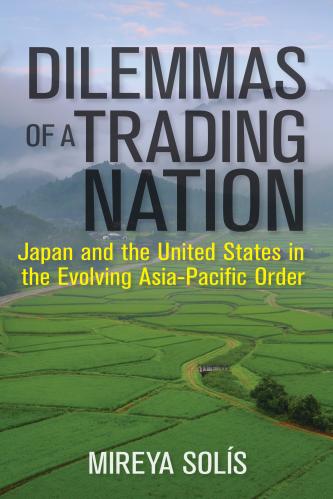
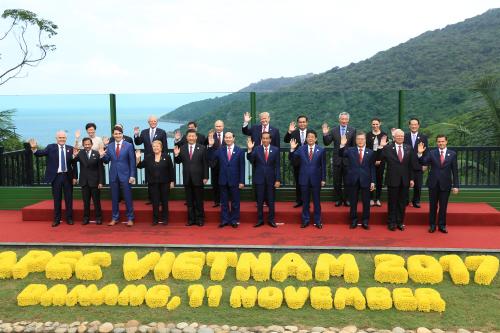
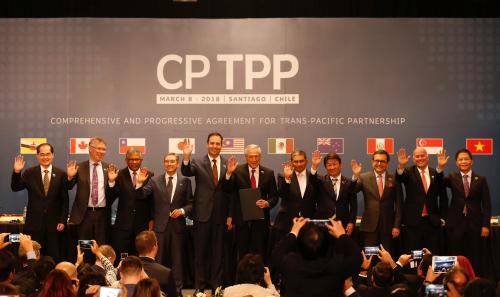

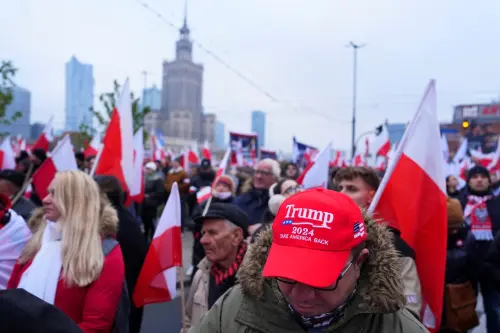

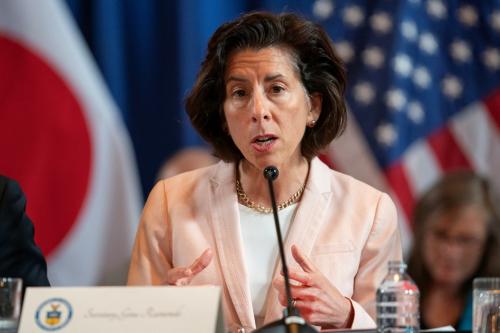
Commentary
Another date at Mar-a-Lago: Will Abe and Trump go steady?
April 16, 2018